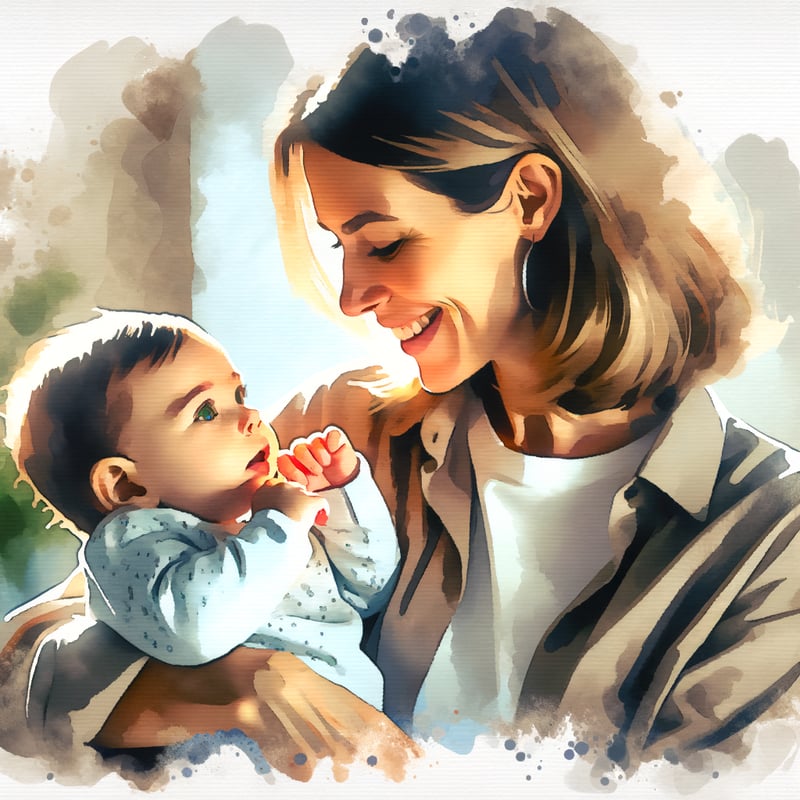1
00:00:01,805 –> 00:00:04,425
Tiago: Uau, olha o Bruno.
{{Tiago: Wow, look at Bruno.}}
2
00:00:04,465 –> 00:00:06,265
Que bebé bonito!
{{What a beautiful baby!}}
3
00:00:06,265 –> 00:00:08,525
Hugo: Muitos parabéns, Sara!
{{Hugo: Congratulations, Sara!}}
4
00:00:08,525 –> 00:00:09,885
Sara: Obrigada!
{{Sara: Thank you!}}
5
00:00:09,885 –> 00:00:13,125
Eu e o Fernando estamos muito felizes.
{{Fernando and I are very happy.}}
6
00:00:13,125 –> 00:00:17,445
Ele agora está a comprar mais comida, mas está a chegar.
{{He is buying more food now, but he is coming.}}
7
00:00:17,455 –> 00:00:20,025
Tiago: O Bruno é parecido com quem?
{{Tiago: Who does Bruno look like?}}
8
00:00:20,025 –> 00:00:21,205
Sara: Com os dois!
{{Sara: Like the both of us!}}
9
00:00:21,245 –> 00:00:23,485
Ele é moreno como o Fernando,
{{He has dark hair like Fernando,}}
10
00:00:23,485 –> 00:00:25,725
mas tem os meus olhos verdes.
{{but he has my green eyes.}}
11
00:00:25,725 –> 00:00:28,645
Tem coisas minhas e coisas dele.
{{He has things of mine and things of his.}}
12
00:00:28,645 –> 00:00:31,105
Hugo: Ele é uma combinação perfeita, então.
{{Hugo: He is a perfect combination, then.}}
13
00:00:31,105 –> 00:00:32,305
Tiago: Sim!
{{Tiago: Yes!}}
14
00:00:32,305 –> 00:00:33,605
Que giro!
{{How cute!}}
15
00:00:33,605 –> 00:00:37,544
Eu também quero ser moreno e ter olhos verdes.
{{I also want to be a brunette and have green eyes.}}
16
00:00:37,545 –> 00:00:39,385
Sara: Mas tu és louro e
{{Sara: But you’re blond and}}
17
00:00:39,385 –> 00:00:43,065
tens os teus olhos azuis, como a tua mãe.
{{you have your blue eyes, like your mother.}}
18
00:00:43,065 –> 00:00:44,804
São bonitos assim.
{{They are beautiful like that.}}
19
00:00:44,805 –> 00:00:48,405
Tiago: Mas quero mudar, são sempre azuis.
{{Tiago: But I want to change, they are always blue.}}
20
00:00:48,405 –> 00:00:52,650
Quero olhos castanhos e amarelos e
{{I want eyes that are brown and yellow and}}
21
00:00:52,650 –> 00:00:58,005
cor-de-rosa e verdes e cinzentos e tudo!
{{pink and green and gray and everything!}}
22
00:00:58,005 –> 00:01:01,305
Sara: Pois, nós queremos sempre mudar tudo.
{{Sara: Right, we always want to change everything.}}
23
00:01:01,305 –> 00:01:05,765
Bem, os teus olhos não mudam, mas a tua pele sim.
{{Well, your eyes don’t change, but your skin does.}}
24
00:01:05,765 –> 00:01:12,185
A tua pele pode ficar muito branca, muito roxa, muito vermelha…
{{Your skin can get very white, very purple, very red…}}
25
00:01:12,465 –> 00:01:15,105
És muito colorido, vês?
{{You are very colourful, you see?}}
26
00:01:15,105 –> 00:01:18,885
Tiago: A mãe fica muito vermelha quando bebe vinho!
{{Tiago: Mom turns very red when she drinks wine!}}
27
00:01:18,885 –> 00:01:20,345
E o pai também!
{{And dad too!}}
28
00:01:20,485 –> 00:01:21,625
Hugo: Tiago!
{{Hugo: Tiago!}}
29
00:01:21,625 –> 00:01:24,745
Sara: Hahaha, deixa estar o teu pai, Tiago.
{{Sara: Hahaha, let your father be, Tiago.}}
30
00:01:24,745 –> 00:01:28,865
Olha, a tua camisa bege fica-te bem.
{{Look, your beige shirt looks good on you.}}
31
00:01:28,885 –> 00:01:30,085
Tiago: Obrigado.
{{Tiago: Thank you.}}
32
00:01:30,085 –> 00:01:35,585
E eu tenho uma gravata cor de laranja em casa, mas não trouxe.
{{And I have an orange tie at home, but I didn’t bring it.}}
33
00:01:35,585 –> 00:01:39,145
Sara: Não faz mal, o Bruno não se importa.
{{Sara: That’s all right, Bruno doesn’t care.}}
34
00:01:39,145 –> 00:01:43,505
Oh, ele está a acordar, queres pegar nele?
{{Oh, he is waking up, do you want to hold him?}}

 Eliana
Eliana Joseph
Joseph Rui
Rui











I had to go through this 3 or 4 times to work out who was who (even with translation) but that’s all to the good for learning Portuguese.
Initially I thought Tiago was a girl (I know his name ends in ‘o’).
Think of Santiago!
I have a question, why does cor-de-rosa have dashes and cor de laranga does not? Thank you 🙂
Olá Melissa. There’s no super logical explanation for that! Our recent spelling reform (Acordo Ortográfico) did away with lots of hyphens, but “cor-de-rosa” is considered an exception and was allowed to keep them in its spelling. You can confirm it here (in Portuguese): Acordo Ortográfico – Portal da Língua Portuguesa
Is “encarnado” also red? Is It the same as “vermelho”?
Yes, ‘encarnado’ and ‘vermelho’ both mean red, they’re synonyms 🙂
Very good practice for me
“Queres pegar NELE ”
Olá,
Could you please explain the use of “nele”. This is the first time I have seen this contraction (?)
Olá Marian. Nele is a contraction of em (in/on/at) + ele (him). The preposition em is typically paired with the verb pegar, but when followed by a personal pronoun, it needs to be contracted for the sentence to sound natural. Here’s more about the preposition em and its contractions: The Preposition “Em” 🙂
The download for Um Linda Bebe A1 shortie retrieves the mp3 ‘Is-17-cores.mp3’ rather than ‘Um-Linda-bebe.mp3.’
Others are also incorrect.
This is the correct audio – it just has a different file name than the title of the Shorty. LS stands for Learning Studio and this is the Shorty that is associated with the Colours unit (“cores” in Portuguese). Sorry for the confusion!
Eu tinha uma outra confusão com “queres pegar nele”. Onde é que é a diferença entre “pegar a.c.” e “pegar em a.c.”? Obrigado!
Olá, Andreas. Se percebi bem a pergunta, queres saber a diferença entre usar ou não usar a preposição “em”? Em português europeu, quando usamos o verbo pegar no sentido de segurar alguma coisa, geralmente usamos sempre a preposição. Por outro lado, no português do Brasil, ela é omitida com mais frequência, por isso a principal diferença está aí, nos padrões de uso de cada variante 🙂
Muito obrigado pela resposta tão rápida.
Sim, perguntava-me quando “pegaria na colher” e quando “pegaria a colher”.
Hi! Love the lessons but find the voices of the children difficult to understand because they are often strained and pitched too high. I do VO professionally, and this is not only unpleasant to listen to, but it is also bad for the voice actor. We can understand he is a child without having to pitch so high!
Thank you for the feedback and sorry about that! This is one of our earlier episodes which was recorded when Rui was basically our only available voice (i.e. when Practice Portuguese was still a bebé 🙂). At that time, we used these different voice effects to differentiate the characters. Thanks to support from our members 😉 , we have more voice actors now, so we don’t do that anymore. I hope you understand!
Thank you for explaining! I really look forward to the lessons and especially the conversations. I’m glad there is more variety to look forward to!
Unfortunately the digitised child’s voice is very hard to listen too, quite off putting. It also comes out a bit distorted depending on what speakers are used. I have noticed it in a few of the audios. But I do like the course other than that. Thank you
Thanks for your feedback and sorry about that! We used to use this to create different voices in some of our older episodes. In our newer episodes, we no longer use the voice distortion, so you’ll find there are fewer of these as you go along. 🙂
Yes, I’m having the same problem. It’s not only grating, it’s really hard to understand what the child is supposed to be saying. I just gave up on trying to understand their lines.
Óla!
Posso dizer “Hoje está quente, não está?” em Portugal? Google Translate não gosta de calor.
Olá! sim, claro que sim! Hoje é que é melhor não dizer isso, que o frio está a chegar… 😀